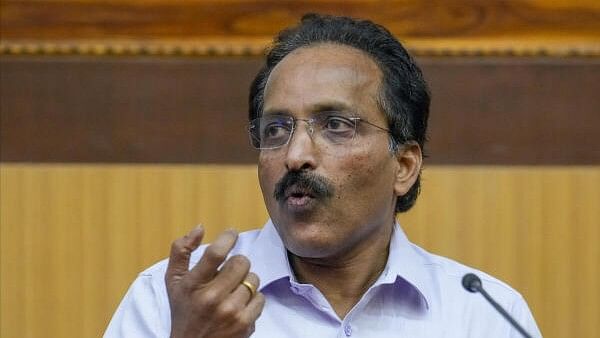
ISRO Chairman S. Somanath.
Credit: PTI Photo
What are the prospects of life on exoplanets? Can we envision a fully sustainable space colony anytime soon? Does private investment have scope in space research, and what are the methods to deal with space junk?
These were some of the many questions posed to ISRO chairman S. Somanath during an hour-long online interaction hosted by ISRO on its Instagram page on Saturday.
A diverse audience of varied age groups and educational backgrounds ensured a lively session packed with interesting questions about space science. Explaining that exoplanets are planets outside our solar system (orbiting different stars), Somanath mentioned that around 5,000 such planets have been discovered so far.
“Looking at their atmospheres, some of these planets have water and are conducive to life; life may be present there too. However, they are hundreds of lightyears away and cannot be easily accessed,” the ISRO chairman said.
Somanath also noted that Kerala has conducted some research on this topic, referring to these planets as ‘home away from home.’ Addressing a question about ISRO’s initiatives in agriculture, he explained that data from high-resolution and medium-resolution satellites help in understanding growth rates and identifying the right areas for agriculture.
“We look at the mineral content, salinity and water content on the earth. With the help of tools, we also make predictions on harvesting. In the future we will build better agricultural satellites” Somanath added.
Scope for geologists
Somanath emphasised that terrain mapping and tectonics are crucial in space science, noting that geologists have significant opportunities in ISRO programs, with many already involved in projects for the organization. “Geological features extracted from images are crucial for understanding the presence of water on Earth,” he added.
He mentioned the potential risks posed by the large number of satellites launched in recent years, which could lead to collisions. He also discussed methalox engines and India’s partnership with the USA in the NISAR (NASA-ISRO Synthetic Aperture Radar) mission.
Career-related queries
Several students, particularly those in their early teens, were eager to learn about career prospects in space science. In response, Somanath said a successful space scientist needs a solid theoretical foundation and practical skills, including proficiency in using instruments like telescopes.